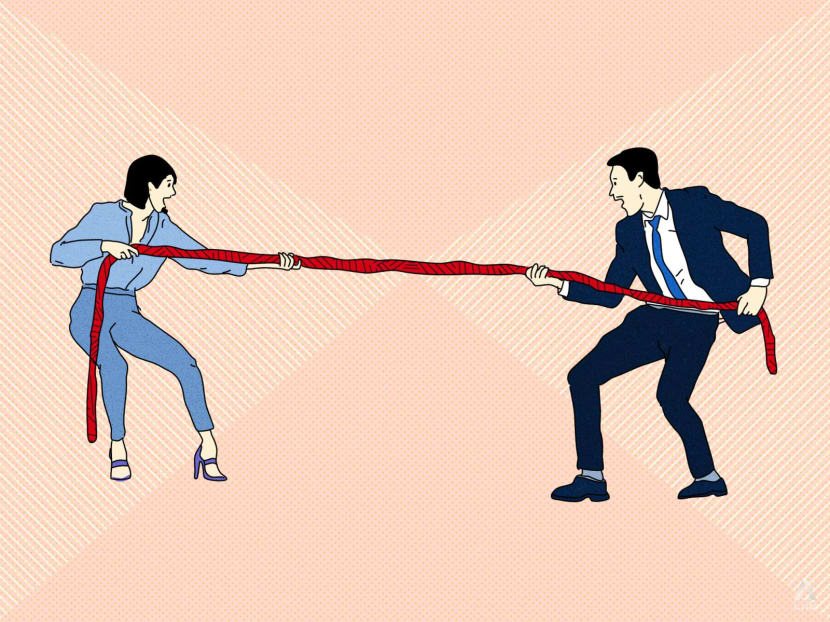How do I manage friendships with colleagues when they are also my work rivals?
Forming friendships with colleagues does not necessarily has to be a win-lose situation, even if their career performance is measured against yours.

Competition at work should never undermine collaboration or lead to resentment, a psychotherapist said. (Illustration: CNA/Samuel Woo)

This audio is generated by an AI tool.
When she worked as a sales development representative in one company here, Ms Madeline Tan, 25, said that it was challenging for her to befriend any of her colleagues.
Working in that office felt like a zero-sum game. If a colleague managed to book a potential client for a product demonstration meeting, her managers would announce the achievement to the firm's leaders, who had kept a close eye on each person's key performance indicators (KPIs).
"It was exceptionally tough on days where you book zero meetings and fall behind while others are progressing with their KPIs," Ms Tan said.
There was even a glass wall displaying everyone's progress, including how many meetings each of her colleagues managed to book. Everyone was measured against each other.
As much as she wanted to befriend her colleagues and celebrate their successes, she could not really find the impulse to do so.
"The reality is my role is an independent one and even if I have direct teammates, I work alone to produce results," Ms Tan added.
"All my teammates are technically my competitors."
Even when Ms Tan achieved her KPIs, she felt like she had to hide that for fear of souring relationships or coming across as too boastful.
"I felt that I had to be careful of what I said and not show how happy I was to have achieved my KPI."
Not all workplaces are as fraught as Ms Tan's, but such stories are commonplace in many competitive work environments where colleagues are pit against each other.
When promotions or high-value work opportunities are at stake, warm office friendships can easily become frosty overnight. Such fragility in the workplace tends to result in a turbulent atmosphere, leading even the most resilient employees to question whether they truly belong there.
Career coaches and human resources experts said that the line separating cooperation from rivalry among co-workers is not always straightforward.
Some friendly competition can allow employees to thrive by motivating them to excel, but there is a tipping point where healthy rivalry transforms into tense encounters, which can be detrimental to both one's career and mental health.
Ms Priscilla Shin, principal psychotherapist at Range Counselling Services, said that too much workplace competition can result in jealousy between colleagues and strain relationships by fostering distrust.
"When competition becomes excessive, it can undermine teamwork and create a culture focused solely on individual achievement rather than shared success," Ms Shin added.
UNHEALTHY COMPETITION AT THE WORKPLACE
So, what determines whether a professional contest at work crosses the line into negativity? Do friendships with colleagues mean that you can't celebrate each other's successes because it came at your expense?
Ms Tan the sales development representative recalled the times when she tried to befriend her colleagues but would often become frustrated when she could not "produce the same results" as them.
"Sometimes, I feel like that frustration unintentionally boils over to being upset with them."
For a start, experts said there is a false impression that competition at work only creates unhealthy dynamics and behaviours. Then, when such competition is in healthy doses, it can drive innovation, spark creativity, and motivate employees to excel.
Ms Tuyen Do from careering coaching firm The Happy Mondays Co said: "Workplace competition can be healthy when it challenges employees to adapt, innovate and perform at their best."
Ms Do, who is a head career coach, noted that growth comes from evolving your skills and mindset, not focusing on outpacing others.
"It's not just about competing harder, it's about competing smarter."
Agreeing, Ms Shin from Range Counselling Services said that friendly workplace competition is "completely normal" and can be healthy when handled well.
"(Workplace competition) can motivate us, push us to grow and encourage creativity," she added. "But we also need to keep it in perspective. Competition should never undermine collaboration or lead to resentment."
Ms Do said that healthy competition "energises and inspires", but the danger is when it leads to obsession or undermines collaboration.
At that point, workplace competition can be counterproductive.
"Having balance is important. Healthy competition will help us grow; unhealthy competition breeds tension," Ms Shin said, adding that healthy rivalry can become destructive when it shifts from growth-focused to putting others down.
Ms Do said: "The real value of competition lies in how it motivates improvement without compromising team dynamics or personal well-being." She noted that employees often thrive in a supportive environment where they can be their best and also value the strengths of others.
"If rivalry starts to feel draining or affects trust within your team, it's likely doing more harm than good," she added.
Workplace competition becomes ineffective and unhealthy when the focus shifts from personal growth to constant comparison with others.
"Healthy competition should inspire collaboration and progress, not create unnecessary tension or distraction," Ms Do said.
Here are some warning signs that trust between colleagues is at risk, the experts said:
- When people become guarded and avoid collaboration
- When they start to gossip negatively about their peers
- When they adopt a win-at-all-cost mentality that harms teamwork
COLLEAGUES WHO BLOW HOT AND COLD
Even in the most collaborative and friendly workplaces, there comes a moment when dynamics shift and ambitions collide.
At first, it may be a subtle change: Colleagues become less forthcoming, conversations feel more calculated and shared goals take on a competitive edge.
During such situations, Ms Shin said that professionals should "remain vigilant" about the overall tone of workplace interactions.
If the environment feels more hostile than supportive, it is time to address the dynamics or set boundaries to maintain balance.
Some common signs that competition affects your well-being are burnout, feelings of inadequacy and overall stress.
Other signs include the stalling of career progression if the rivalry shifts focus from skill development to one-upping others, leading to missed opportunities for genuine personal growth.
When one realises that this is happening, it is time to stop fixating on outpacing others and channel your energy into personal growth and improvement, the experts said.
One strategy that Ms Do suggested for combating such situations was to start by "identifying the root of the difficulty".
She said that it would be helpful to pin down whether the issue was miscommunication, competing priorities, mismatched expectations, or a deeper cultural issue within the organisation.
"Understanding the cause helps you determine whether it's something you can address directly," she said. "Focus on what's within your control – clarify your goals, set boundaries to protect your time and energy, and seek guidance from mentors or trusted colleagues."
Mr Vinod Balagopal, director and career counsellor of mental health and human resources developer Gary and Pearl International, said that when workplace competition becomes the overwhelming focus for employees, it is better to focus on one's growth rather than on anybody else's.
"Hone in on the part (of your work) you like to do and do more. Ask yourself, 'What excites me?' Then do it," he added.
Sharing his sentiments, Ms Shin said that it is best to be clear about one’s goals, avoid comparing one’s journey to others and focus instead on individual progress.
As for workplace misunderstandings, the experts agreed that open communication and having honest conversations to re-establish trust can often be helpful.
"Having open communication and shared learning can strengthen our relationships, making it easier to succeed together," Ms Shin said.
IF I'M AMBITIOUS, CAN I STILL HAVE WORK FRIENDS?
What happens then if one relishes the competition but does not want to step on anyone’s toes and lose friends? Progression and ambition go hand in hand after all.
To this, the experts said that being ambitious and having friends at the workplace do not have to be mutually exclusive.
"I've found that supporting others doesn't take away from your ambitions; it amplifies them," Ms Do said.
Ms Shin said: "Professionals can balance support for colleagues with personal ambition by having a mindset of collaboration over competition."
When you are clear about your goals, you can approach collaboration with confidence, knowing exactly what you bring to the table. It is about creating an environment where success feels shared, Ms Do added.
You do not have to be close friends with everybody at work, but being friendly with colleagues is essential for building trust and collaboration, the experts advised.
"Trust is what allows us all to take bigger risks, collaborate meaningfully and achieve more", Ms Do said. "When one person thrives, it builds momentum for the entire team."
Another way to foster trust is to celebrate others' successes, offer help or encouragement when they face challenges, and recognise that teamwork often elevates everyone involved, Ms Shin said.
"Genuine support comes from knowing that success isn't a zero-sum game."
She also said that sharing knowledge, offering guidance and recognising the strengths of those around you foster trust, which is essential to propelling the team forward.
If recognising someone else's success triggers discomfort or comparison, that is something worth exploring, Ms Do suggested.
"It might be pointing to areas where your own goals or self-worth need more clarity," she said.
"What matters is fostering mutual respect and a supportive environment where ideas flow and teamwork thrive."














